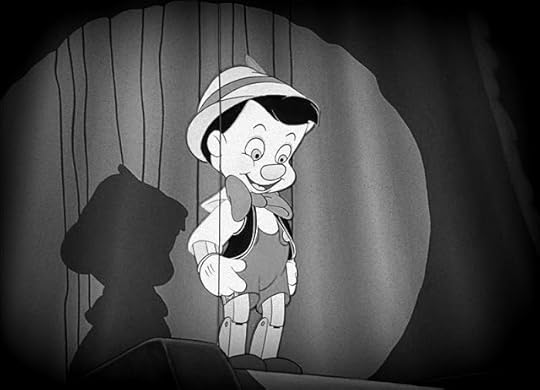Sarah Allen's Blog, page 9
April 11, 2016
Strings On Me and a Children's Agent

Strings On Me
When Gep woke from the dream, he could still see the giant leviathan bearing down on him when he closed his eyes. He reached his hand over and felt the cold half of the bed. He wondered if, tonight, his wife was also dreaming of monsters.
He looked at his clock but it confused him. Time didn't make sense anymore. It had been three weeks since it happened. Two weeks since the funeral. One week since he'd found the empty pill bottle and taken his wife to the hospital to have her stomach drained. He didn't know when she would be back.
He could feel the waves of what had happened cresting inside of him, and he sat up in bed in an attempt to keep from drowning. It didn't help much, and he rocked back and forth until he was afraid he was going to rock himself to pieces, and he stood up and paced the floor and ended up in the hallway, walking past the bathroom, toward the door of the other bedroom that hadn't been opened in days.
Hadn't been opened in three weeks.
The dream was overwhelming him, and he knew he had to see the empty room with his own eyes or he might start going crazy. He pushed open the door.
Moonlight streamed through the window, illuminating toys that hadn't been put away, and the small, empty wooden bed. It was as if the moon was mocking him. There were too many empty beds in this house.
What was it his son had said to him? In the dream? Maybe the dream was the first step toward madness, but he couldn't bare to let it slip away. His sternum ached like someone had hammered nails into it. It had for several days now.
Without really intending to, he lay himself across the pale blue sheets and settled his face into the pillow. It smelled of bubblegum toothpaste and M&Ms and the peculiar little boy dirt, and Gep knew that this smell would be what killed him.
In his dream he'd escaped the leviathan, holding the boy in his arms. He could still feel the wait of him. He could still feel the dent in the skull where the bumper had made contact.
When he finally began drifting off, the smell and moonlight pouring into him like chloroform, he heard an echo of the boys voice. "Papa," the dream had said. "Papa. I want to be a real boy."
***
Writing Prompt: If you were to write about a secondary character from any fairy-tale, who would you pick?
Agent Spotlight: Check out this Literary Rambles spotlight for more information on a great children's agent.
Read More: 7 Resources to Make You a Better Writer from The Write Practice
For more frequent updates, writing tips, and funnies, follow on Facebook, Twitter, Google+,
YouTube, Pinterest, Tumblr, GoodReads, and/or Instagram. Or if you enjoyed this post, sign up to get blog posts delivered to your inbox.
Published on April 11, 2016 05:00
April 4, 2016
Shared Differences and a Call for Submissions

Shared Differences
He said, take this watermelon.
It is something we have in common.
Hold the gnawed rind up to your face
like a smile.
I said, I take thee, smile,
for mine own.
That's right, he said. That's right.
I said, I take thee, stadium lights
I take thee, sidewalk crack
I take thee, plutonium core
of a hydrogen bomb.
Then he and I and all of us
smiled a mushroom cloud
and when the smoke cleared, we all
turned to our neighbor and said
Here, take this face.
It is something we have in common.
***
Writing Prompt: Finish this sentence (and share in comments so we can see your genius!)
My toothbrush is red. This is the most important thing you need to know about me because_____________________________.Call for Submissions: Funny in Five Hundred is looking for flash humor pieces. Try your hand!
Read More: Check out Anne R. Allen's great post this week on keeping an open mind and teachable heart so we don't get caught in our own flawed perspectives as writers.
For more frequent updates, writing tips, and funnies, follow on Facebook, Twitter, Google+,
YouTube, Pinterest, Tumblr, GoodReads, and/or Instagram. Or if you enjoyed this post, sign up to get blog posts delivered to your inbox.
Published on April 04, 2016 05:00
March 28, 2016
Killed the Cat and an Agent Spotlight

Killed the Cat
He knew what she wanted. Her with her pristine white coat and sapphire studded collars. She wouldn’t be satisfied until she’d taken the penthouse and everything in it. He walked the railing, looking out over the city. His city. She could have the place. What did he care. His brother had that boat out on the bay, and he had his health. The butler opened the glass door to the balcony. “Can I get you anything this evening, sir?” he said. “Get me the lights, Manfred,” he said. “The city lights.”
***
Agent Alert: Elise Erickson seeks Romance, Some YA, etc.
Read More: Check out Jane Friedman's excellent post on how to start blogging.
For more frequent updates, writing tips, and funnies, follow on Facebook, Twitter, Google+,
YouTube, Pinterest, Tumblr, GoodReads, and/or Instagram. Or if you enjoyed this post, sign up to get blog posts delivered to your inbox.
Published on March 28, 2016 19:15
March 7, 2016
How To Keep In Touch With Future Readers

So, as someone working on my writing career, but without a book published just yet, this is something I've pondered on quite a bit. I don't want to miss chances, you know? When you have a book out, every person you meet can know you as the author of that book. But how do you bring prospective readers along with you on the journey before you've got the book out?
I don't want to miss connections. I don't want to lose track of people.
The first thing I automatically think of is a newsletter. We've been told time and time again that newsletters are the big deal, and that collecting emails should be our focus. On one level this makes sense to me. This isn't putting something on some social media and hoping it gets seen. This is knowing someones number. This is being able to talk to them individually. This is finding their house and stalking them until they buy your book. Er, wait. No, not that. The point is, its personal.
Here's the thing though. I asked myself, have I ever bought a book based on an authors email newsletter? The answer is a definite no. I've never bought someones book because of anything they emailed me. In fact, I don't even subscribe to any author newsletters. There are a few authors whose blogs I keep in mind and remember to check regularly, which is sort of similar, but that number is very few. I would, however, remember those bloggers names if I ever saw their books. In fact there are a few of their books on my to-buy list.
So newsletter doesn't quite fit, and blogging is a sort of sometimes, and only if you're a serious blogging Rock Star. (I'm talking Anne R. Allen and Chuck Wendig.) Its sort of similar on other social media. There are a very few people whose YouTube channels, Tumblrs and Instagrams I know by heart, and check regularly.
What I've come up with so far is basically what Steve Martin said: Be so good they can't ignore you. This is true of blogging and social media too. I remember the ones I remember because I truly adore and value what they provide. I just love their work.
So. While I'm working on ways to incorporate this idea into my own social media, I'd love your thoughts. How do you keep track of writers?
Sarah
For more frequent updates, writing tips, and funnies, follow on Facebook, Twitter, Google+,
YouTube, Pinterest, Tumblr, GoodReads, and/or Instagram. Or if you enjoyed this post, sign up to get blog posts delivered to your inbox.
Published on March 07, 2016 06:00
February 15, 2016
The Three Things An Editor Notices First

AAHHHH EDITORS!!
Just kidding. Actually, editors seriously rock. Especially the good ones.
Anyway, this Saturday was the annual Life, The Universe, and Everything conference, where us hopeful and dewy-eyed writers got to learn at the feet of masters such as Brandon Sanderson, M.T. Anderson, Mary Robinette Kowal, and Shannon Hale. There's just something so completely cool about actually seeing in real life the actual, flesh and blood person behind the books that have changed your life.
*We now interupt this program for a Public Service Announcement*: Shannon Hale is amazing and a goddess and she gave the keynote address and you should all go read this post on her blog RIGHT NOW. I'll wait. Back? Okay. *ahem* Now back to our regularly scheduled program.*
So anyway, one of the most practical workshops I attended was given by a professional editor who spoke as cleanly as he preached, and had some seriously great advice to give. One of the things he mentioned were the top three things he and other professional editors notice when they receive a new manuscript.
First, though, why should we care? That's a fair question. We are artistes, after all. What care we for the gruff and superficial opinions of others? Well, first of all, we need others. As the analogy goes, be the artist for a while, soak in the muse and creative juices, make your masterpiece shine, and then LOCK that artist in the closet, STEAL the manuscript and run away cackling and SELL IT for as much moulah as you can get. I'm sorry, if you want writing to be your job, that's how you've gotta do it. If you're just writing for yourself, then just write for yourself. But if you really want to get your work out there and be taken seriously, then plain and simple, you're going to be dealing with editors.
Editors are great. They're human just like everybody else, and are trying to get the best work they can to publish the best product they can. Our job as writers is to make it easy for them to say yes. As easy as possible. (Yes, this means following submission guidelines. If they ask you to send your manuscript in size 42, Comic Sans font on yellow paper, then you darn well send it in size 42 Comic Sans font on yellow paper.) But these guys see so, so many submissions a day, that even you follow the instructions to a T, how can you make yourself stand out of the pack in a positive way? Well, according to this one editor at least, here are three things editors notice first when they pick up a submission:
1. The Prose: This may seem backwards. We often think of clean prose as the icing on the cake, and all the meaty, juicy stuff like character and plot and theme and voice as the stuff that really matters. However, thinking this way may be doing yourself a disservice. You may have the coolest characters ever, but if your prose isn't clean and flowing as rainwater, then they can't even see those awesome characters. They're buried and distorted under the brackish muck. There are SO many resources out there about good characters and cool plot twists and how to improve your writing voice, but not so many on good grammar. However it's not as nasty as it sounds, and this editor even has a rare great resource. Check out his blog The Story Polisher. I plan to go through his posts, and I know it will help make my writing what I envision it to be.
2. Structure: After making sure they can read your writing, the editor wants to know if you can tell a good story. Spin a good yarn. They want a chauffeur who knows what they're doing--student drivers make us all sick. Make sure you're reading a lot, and picking up what the overall structure of a successful story looks like. Have other people read it to make sure there aren't confusing or boring bits. Make sure your ending feels right in the story, and the editors who receive your piece will cry in gratitude.
3. Creativity: Editors also look for something they haven't seen a heptillion times before. Don't stress out too much about this though. C. S. Lewis says, "Even in literature and art, no man who bothers about originality will ever be original: whereas if you simply try to tell the truth (without caring twopence how often it has been told before) you will, nine times out of ten, become original without ever having noticed it." Just be you, as you as you possibly can, and you're work will be a breath of fresh air.
Two more quick things the editor said that I think are worth mentioning. First: we all make stupid mistakes. All of us. Don't feel bad when you do. Just learn and fix and improve for next time around. (I'm working on this as much as [more than] anyone). And second, this editor actually said that items two and three are what he can help you with. He can help your story's overall structure and help you make your idea a little more unique. However, if your piece is riddled with errors and the prose is broken, it will take him twenty times longer to try and teach you the rules of language, and fix every mistake. So make sure you're learning that well on your own (or in a class). I hadn't thought of things that way before, but I'm glad I know now.
Whew. This was kind of a long one, but I hope it was helpful. Get that writing polished and don't be scared to submit!
Sarah Allen
For more frequent updates, writing tips, and funnies, follow on Facebook, Twitter, Google+,
YouTube, Pinterest, Tumblr, GoodReads, and/or Instagram. Or if you enjoyed this post, sign up to get blog posts delivered to your inbox.
Published on February 15, 2016 05:00
February 8, 2016
Blogging As An Unpublished Writer: Am I A Sham?

I've been having some blurry thoughts about blogging in the last few weeks and months. I feel all conflicted about it, and perhaps unnecessarily so. But still, I have so many questions and vague ideas and I want to make sure I'm doing this right. Often I feel like an impostor.
I've decided a few things about blogging:
I love it. I do. Genuinely. I love that it forces me to write, and I love that I get to talk to all of you guys.
It feels obsolete. In some ways, it really does feel like blogging has gone the way of payphones. Maybe a few people still use them, but you gotta kind a look at them a little suspiciously, and wonder why. People post funny GIFS and videos all the time, but I don't know the last time someone on my Facebook or someone even IRL was talking about a blog post they'd read.
It still feels necessary. So, even though blogging isn't The Thing anymore, and even though its not going to sell books or make me wildly popular, I'm still very glad I have it, and am definitely not giving it up. To me blogging is sort of like a dictionary for any given writer. The dictionary itself isn't going to be the glitz and glam that gets the career going (probably not, anyway) but its important to just have it there, so people can come back to check it every once in a while.
The Chuck Wendig vs. Anne R. Allen philosophies. Chuck and Anne are two of my all-time favorite bloggers, but for completely different reasons. I actively look forward to Anne's weekly posts because they are by far the most informative of pretty much any blog out there. She goes in depth, and makes sure every topic and angle is well covered. Its a master class in being a writer. Chuck, on the other hand, posts irregularly and his content is widely varied. He posts his own photography, or flash fiction contests. His blog you can pop in whenevs, get some laughs, have a good time, and head out. In my ideal blogging world, I want to have both sides. I dunno if its possible, but I'd like to.
I don't like giving writing advice. Both Chuck and Anne give great advice, but I've noticed something: its less about how to write and more about how to be a writer. The business and lifestyle side of things. That makes sense to me, because I don't know if I like sort of anonymous writing advice. A person improves there writing by learning from people and mentors in real life, and especially by having other people read their actual writing.
So with all that in mind, I'm trying to figure out what I really want to do with this here blog. I want to do some exciting cool things with it. I know I couldn't be another Anne or Chuck. I'm not as funny as Chuck, and not nearly as smart and wise as Anne. So I'm trying to figure out me as a blogger, especially given that I haven't published yet. (Still working on that. I'll be working on that till the day I die).
So here's my question: What are your favorite blog topics? And who are your most regularly checked, consistently favorite bloggers?
I'll take all the ideas I can get :)
Write on!
Sarah Allen
Published on February 08, 2016 05:00
February 1, 2016
There IS a Magic Key to Writing Success
 People say all sorts of things about writing. In fact, so many people say so many things that all the advice can seem confusing and really, really complicated. Peoples advice on "Achieving Success As A Pusher of Words" can feel like "Stand on one foot while singing the national anthem and flipping pancakes and if you do that just exactly at 8:88 PM when Venus and Jupiter are aligned you just might get an agent to read your work."
People say all sorts of things about writing. In fact, so many people say so many things that all the advice can seem confusing and really, really complicated. Peoples advice on "Achieving Success As A Pusher of Words" can feel like "Stand on one foot while singing the national anthem and flipping pancakes and if you do that just exactly at 8:88 PM when Venus and Jupiter are aligned you just might get an agent to read your work."I'm here to tell you, its much simpler than that.
There IS a magic secret to success. And for a mere $200,000, that secret can be YOURS
Just kidding. It's not really a secret, its just something I've learned in the last few months. I've come to the conclusion that there really is one single thing that can make ALL the difference. That doesn't mean you don't still have to put in the work, but there is just ONE thing you can do that will take you from being someone who likes writing to being someone who's an ink-slingin writer by darn. Ready for the magic secret? Here it is.
The key is writing groups.
With a good (emphasis on good...we'll get to that) writing group, so many of your bases are covered. Writing groups help you:
1. Write better.
2. Feel like writing.
3. Write to a schedule.
4. Write betterer.
5. Learn the industry.
6. Make connections.
7. Make more connections
I could go on. Every single one of these benefits has happened for me in the last few months (even weeks) because of writing groups. I am really not good at networking. I am quite friendly, but I am clueless about how to turn friendliness into meaningful connections. However in my workshop last semester I met someone who is literally a genius at connecting and networking, and for the people I've met alone, the price of tuition is so worth it. I am learning so much, and feeling a part of something great more than I have maybe ever. All because of writing groups.
Now, of course, there's a caveat. We all know that writing groups can totally fail too. But just do whatever you gotta do to find a good one, because honestly without it I feel like you'd be trying to compete in NASCAR on a camel. If you are serious about writing, or really about anything, get other people to help you. Its so much better than trying to do it alone.
Write on!
Sarah Allen
Published on February 01, 2016 06:00
January 25, 2016
Its Not Over Till You've Won
 Computer games, whatever your opinion of them, can actually be quite an apt analogy for life, in my opinion.
Computer games, whatever your opinion of them, can actually be quite an apt analogy for life, in my opinion. You start out, excited and ready. You work hard, you learn a lot. You make progress and hit your first Big Boss. It might take a few tries, but finally you beat him. You've developed skills that finally enable you to beat the boss and get to the end.
And then you go to level two.
Level two teaches you how much you still have left to learn, and it hits you maybe for the first time how many levels there are ahead of you. It's very easy to give up at this point. You've had some success. You've beat a Big Boss already, haven't you?
This is the make or break moment, and we all face them. Maybe in some areas its okay to leave it here, but we all have something that we're determined to see it through to the end. For us its writing.
I've had half a dozen rejections in the past week, and that can be really disheartening. Here are a few things I'm remembering, and maybe remembering will help you too.
I'm remembering that I'm getting so many rejections because I'm doing so many submissions.I'm remembering that many of these rejections are personal and final cut rejections. I didn't get any of those a few years ago. This is progress.I'm remembering that Brandon Sanderson wrote 12 novels before he got one published, and now look at him.I'm remembering that I am two writing groups richer than I was a few months ago, and this has made my writing much better.I'm remembering that I just have to keep writing, because something eventually will work out.I'm remembering that music always makes me feel good.
Write on!
Sarah
Published on January 25, 2016 05:30
January 18, 2016
Do You Have Your "Happy Things" Arsenal?
 One of the worst parts about feeling down, for me, is that I feel completely not myself. Feeling sad and depressed is like wearing stilettos in the Amazon, or bringing an elephant to the New York Stock Exchange. It just doesn't feel natural. And then I get frustrated for feeling like I'm not myself, which only adds to the cycle of melancholy.
One of the worst parts about feeling down, for me, is that I feel completely not myself. Feeling sad and depressed is like wearing stilettos in the Amazon, or bringing an elephant to the New York Stock Exchange. It just doesn't feel natural. And then I get frustrated for feeling like I'm not myself, which only adds to the cycle of melancholy.I don't know about you, but I don't work very well under those conditions. To me its like trying to write while wearing a space suit, or while a ferret is bouncing on your head. I know there are many writers, dead and living, who are able to use these really heavy feelings as fuel for writing, but that's just not the way it works for me. I think sadness and depression can be incredibly important in writing, and I use them as sort of the rods that hook the story to the ground, but they're not the concrete foundation.
Plus its just no fun living that way.
Caveat: I'm not talking about clinical depression here, and other chemical imbalances. Those issues need to be dealt with very carefully, and if that's what you're dealing with, please don't feel afraid or ashamed to seek help.
What I am talking about is knowing oneself well enough to know what yanks you out of those slumps and back into feeling your happy, normal self. Have your "Happy Things Arsenal" ready for when those slumps inevitably come.
Here are three things from my arsenal:
Exercise: I never thought I'd say this, but exercise makes me happy. I've finally learned that the begrudging preparation for going to the gym pays off big-time in how I feel when I leave. So I'm recommending exercise, but with this thought in mind: don't listen to/watch what anybody else is doing. And that includes your past self. If you've previously felt obligated to love running, and actually despise it, but secretly love swimming laps, then by all means, SWIM LAPS. If your friends all love Yoga but you love biking, then go biking! Or just take slow walks with your dog, or dive into cross-fit if that's your jam. But essentially, listen to what YOU love, and do that. That's what ends up being sustainable.
Friends and Family: This is an obvious one, but so obvious that I've occasionally found myself forgetting that its there in my Happy Arsenal. I forget that I have a couple people in my life that ALWAYS make me feel better after I talk to them. My mom, my college BFFs. Figure out who those people are in your life and don't take them for granted. When you start sensing melancholy coming on like a bad cold, call them immediately. Maybe even while you're on the way to the gym. It will stop the sadness snowball from causing an avalanche.
Faith: I think sometimes, at least for me, sadness and depression is directly related to imbalanced priorities. It's the whole mountains and molehills thing when you're not looking at things with that clearer perspective. We all know what's most important in our lives, but its so easy to forget. So whatever you do that reminds you of something bigger, that strengthens your felt connections to divinity, do those things. Pray, read the Bible or the Quoran or Wallace Stegner. Watch The Prince of Egypt or take a walk or meditate. Do all those things, or whatever it is that brings you spiritual peace.
Here's the video that directly got me out of my slump this week. It's a talk given by LDS apostle Dieter F. Utchdorf, and though its directed toward young women, I recommend it to all. I personally don't see how one can listen to this talk and feel sad afterwards. In fact, (and I know its 20 minutes so this might be asking a lot) but I'm very, very curious what you guys think of it. I'd love to know in comments:
Write on!
Sarah
Published on January 18, 2016 05:30
January 11, 2016
Why Should We Ever Do Things We Don't Wanna?
 It's been harder than I thought, retracting from an "adult" back to being a student. There's a sense of independence and autonomy that you just can't get as a student because you're constantly under deadlines, constantly trying to balance things like money and social life, constantly dealing with the niggling in the back of your mind whenever you're doing something that's NOT HOMEWORK.
It's been harder than I thought, retracting from an "adult" back to being a student. There's a sense of independence and autonomy that you just can't get as a student because you're constantly under deadlines, constantly trying to balance things like money and social life, constantly dealing with the niggling in the back of your mind whenever you're doing something that's NOT HOMEWORK.Don't get me wrong, I'm also totally loving it, and being around real life people who have much the same passions and are on much the same trajectory as I am is wonderfully refreshing. I've said this before, but I'll say it again: I've learned so much about my own writing through just getting all this great feedback and there's no way I would have been able to learn it on my own. (I'm beginning to believe that basically the BEST thing you can do for yourself as a writer is to make sure you're in a good writing group.)
I've been thinking about the idea of doing hard things that we don't want to do, partially because I'm confronting a little of that myself (uuughh literary theory) but mostly because I think its such an odd cultural phenomenon in our modern society. We just aren't used to doing things we don't want to. Or not doing things that we really wanna.
Writers deal with this pretty regularly, I think. The most passionate writer still has areas they really don't enjoy. (Editing? Social media? We all have 'em). And we also have days where all we really want to do is pull up Netflix and watch the last season of Parks and Rec for the third time. (I really don't blame you. Leslie Knope is my idol, and Ben Wyatt is my squee. Plus, ya know, Chris Pratt.) So why don't we? Why should we ever deny ourselves when nobody's forcing us to sit in a chair and write? Why should we edit that bleeping chapter AGAIN when nobody has a gun to our head?
The solution, I think, is to take the longer view. Yeah, for this 6 hour period, I really, really, really just want to eat muffins and catch up on Downton Abbey, but tomorrow and next week and next month I will be very glad if I use these six hours to get in 750 words instead. Or, as another example, blogging and social media has been a real struggle for me lately. That stuffs not the most important part of a writing career, by any means, but its still important, and its been frustrating for me mostly because its typically been one of the parts I enjoy most. I LOVE blogging and talking to you guys, and posting on social media and interacting with intelligent people who love what I love. So why am I sitting here tonight writing this even though I'd much rather be reading? Because I know that first, its not really that difficult once I get into it, and also, the reward is fantastic. Brightening or enlightening one persons day is worth any effort I put into my little blog posts. That's the long view.
So maybe as we start this new year, we should start it with a little grit and courage. I'm going to try to, anyway. We can do the things we are afraid or impatient about doing. We can avoid doing things, even good things, to an extent that it takes us away from the most important things. There's a joy that runs much deeper than pleasure, and even though pleasure is important, I'm trying to remember not to sacrifice the one for the other.
Write on!
Sarah Allen
Published on January 11, 2016 05:00



